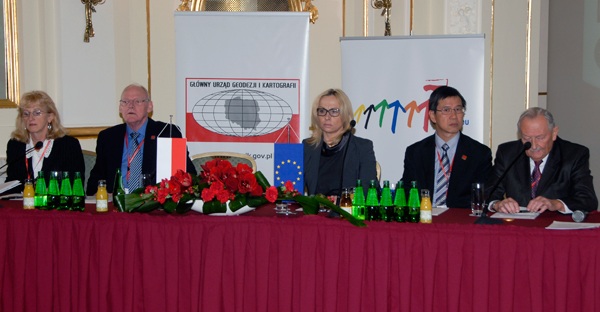Cadastre in sustainable spatial management - The future of
cadaster
October 2011 Warsaw, Poland
|

Keynote session of the 3rd Cadastral Congress, from left to right:
Dr Ludmiła Pietrzak, Prof Stig Enemark, Jolanta Orlińska, FIG
President Teo CheeHai and Prof Andrzej Hopfer. |
President CheeHai TEO joined the 3rd Cadastral Congress in
Warsaw, Poland. The theme was ‘Cadastre in sustainable spatial management’.
The Congress was organized by Association of Polish Surveyors in close
cooperation with the Head Office of Geodesy in Poland. About 150
participants from 19 countries joined.
The Congress was held under the auspicious of President of Poland Mr.
Bronisław Komorowski. The participants were welcomed by
Stanisław
Cegielski, President of the Polish Association of Surveyors, Jolanta
Orlińska, Surveyor General of Poland and Mr. CheeHai Teo -
President FIG. Prof. Stig Enemark, Honorary President of FIG, gave a
keynote.
Issues discussed were the future of Cadastre (Cadastre 2014plus),
cadastral reforms in local and global scale – integration of the technical
and legal part of cadastre, cadastre in the field of disaster management and
cadastre in the European Union.
The ambitions of the Polish Cadastre are to build a innovative and fully
transparent land administration, to support in e-government, to support in
participatory approaches (spatial planning), to integrate land
administration with other public registers and to support to cross-border
services (the EU Digital Agenda) and INSPIRE. Presenters at the Congress
emphasized that the majority of data included in the cadastre, especially
the spatial data can serve as a primary reference to the other public
registers. Future cadastre should register in real time all rights,
limitations and duties. An institutional fundament is needed.
The Congress recommended:
- to recognize cadastral systems as a part of a wider state
information infrastructure including the legal framework and with
relationships to various users, especially with the financial and
banking sectors,
- to institutionalize cadastral systems in a coordinated manner in
order to get the maximum benefit from the cadastre, and
- to consider that a cadastral system supports into long-term
financial investments
Progressive, incremental cadastral development is realistic, taking into
account available resources for their implementation. Essential is the
definition and availability of appropriate data and applications
standards.
Ludmiła Pietrzak
www.geoportal.gov.pl
www.fig.net
23 February 2012
|























